|
|
|
Sort Order |
|
|
|
Items / Page
|
|
|
|
|
|
|
| Srl | Item |
| 1 |
ID:
189558
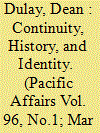

|
|
|
|
|
| Summary/Abstract |
In May of 2022, Bongbong Marcos won a commanding 59 percent of the vote to become president of the Philippines. His victory was, on some level, shocking to scholars and analysts of Philippine politics. As a result, a plethora of different theories have been proposed, in an attempt to explain why Marcos won. In this paper, we use nationally representative survey data to explore which factors predict (and do not predict) voting intention for Marcos. We find that, a) support for former President Rodrigo Duterte, b) positive perceptions of the late President Ferdinand Marcos and martial law, and c) ethnic (linguistic) identity are strong predictors of voting for Bongbong Marcos. On the other hand, age, education, and income are not. Consequently, theories based on continuity, coalition, history, and identity provide the most leverage on the question of why Bongbong Marcos won the election.
|
|
|
|
|
|
|
|
|
|
|
|
|
|
|
|
| 2 |
ID:
099280
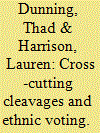

|
|
|
| 3 |
ID:
176488
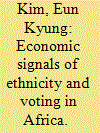

|
|
|
|
|
| Summary/Abstract |
The existing literature has demonstrated that both ethnic and economic factors affect a vote decision in African democracies. I show that there is a meaningful interaction between the two cleavages in their influence on voting. In particular, I argue for political salience of agricultural subsectors that shape the electoral consequences of economic performance in the context where agricultural policy affects the livelihood of the majority population. Relying on the analyses of the 2007 and 2013 elections in Kenya, I illustrate how likely an individual, who is attached to a politically coherent ethnic group, votes for a candidate, the majority of whose ethnic members engage in the same industry as the voter himself regardless of the candidate's ethnicity. The results show that the sector factor reinforces the positive and negative effects of ethnic communities on incumbent support, and also explains voting by ethnic minorities whose motives for voting are not ethnic.
|
|
|
|
|
|
|
|
|
|
|
|
|
|
|
|
| 4 |
ID:
138428
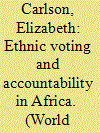

|
|
|
|
|
| Summary/Abstract |
The strong support that African presidents retain among voters of their own ethnicity, despite clear evidence of shirking and corruption, has prompted numerous empirical investigations into whether an incumbent's ethnicity or performance is more important to African voters. The model of vote choice underlying almost all of these studies is additive and implies that either coethnicity or good performance can increase a candidate's vote share. However, there is little theoretical justification for such a model. In the dominant theory of ethnic voting in Africa, coethnicity is a signal of better outcomes, indicating that ethnicity and performance are not separate considerations. Using an experiment that is designed to determine how Ugandan voters make choices, the author shows that the effects of coethnicity and good performance interact: neither attribute increases support for a candidate in the absence of the other. Though previous analyses indicate that, all else being equal, voters always prefer coethnics, this study demonstrates that coethnics only have an advantage when they are not shirkers. Additionally, though previous studies indicate that voters always prefer good performers, this analysis shows that voters are indifferent to the performance of non-coethnic candidates. The article provides evidence that this pattern is in fact a result of voters' beliefs that they will only receive future goods from coethnics, making a demonstrated ability to provide such goods relevant for the electability of coethnic candidates, but not for non-coethnics. Since a large number of African voters do not share the ethnicity of their incumbent, this finding has troubling implications for accountability of African leaders.
|
|
|
|
|
|
|
|
|
|
|
|
|
|
|
|
| 5 |
ID:
185496
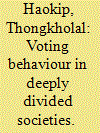

|
|
|
|
|
| Summary/Abstract |
Voting patterns in the hills of Manipur show high ethnic voting indicating extremely partisan attachments. The salience of ethnicity in voting preference is reinforced by conflicts in the past. Periodic elections only exacerbated such divisions through partisan mobilisation and competition for representation along ethnic lines. Cross-ethnic voting is prevalent among groups wherein cousinage alliance cannot be forged due to past conflicts. The neck and neck competition for political representation among ethnic groups has sidelined the democratic rights of individuals over partisan group interests. In such deeply divided societies ensuring individual rights is the challenge of democratic governance, and the only viable solution to this pervasive problem appears to be a constitutional reform with the aim of having a more inclusive representation.
|
|
|
|
|
|
|
|
|
|
|
|
|
|
|
|
|
|
|
|
|